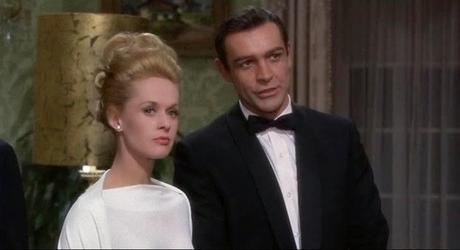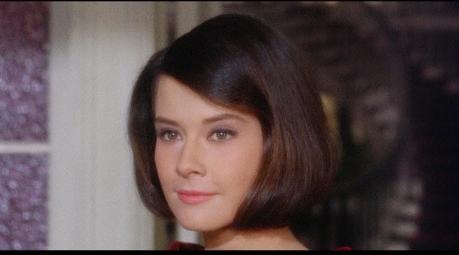 Marnie (1964) has long divided Alfred Hitchcock fans. Much discussion centers on Tippi Hedren's performance, but this movie has deeper problems. It's a grab bag of auteurist tricks without purpose, a beautifully shot mess.
Marnie (1964) has long divided Alfred Hitchcock fans. Much discussion centers on Tippi Hedren's performance, but this movie has deeper problems. It's a grab bag of auteurist tricks without purpose, a beautifully shot mess.Marnie Edgar (Tippi Hedren) is a serial thief preying on rich businessmen. Her latest employer is Mark Rutland (Sean Connery), who falls for his new secretary. Mark catches Marnie in the act and entraps her into marriage. Mark soon discovers Marnie is a neurotic mess: terrified of red color and thunderstorms, unable to bear a man's touch. Mark resolves to cure Marnie, curing her kleptomania and confronting Marnie's man-hating mother (Lois Latham).
Marnie seems a directorial highlight reel, each scene calculated to showcase Hitchcock's brilliance to the Cahiers crowd. There's no denying that Marnie's artistically exquisite: Hitchcock and photographer Robert Burns relish bursts of vivid colors, from the ever-present red to sparkling yellow taxes and Rutland's green estate. Several scenes are top-notch Hitch: the exhilarating opening, Marnie and Mark's savage wedding night, a spellbinding split screen set piece where Marnie robs a safe as a janitor sweeps the next room.
But Hitchcock balances brilliance with overwrought showboating. There's the laughable matte effects, from Marnie's dockside neighborhood (resembling a wall mural) to phony city-scapes. A fox hunt has striking widescreen photography, ruined by cheap rear projection in close-ups. And Hitchcock's recurring motif of Manrie's red-tinged freakouts grows ludicrous with repetition. Even Bernard Herrmann's score seems overbearing, loud even in quiet moments: this might be the only film where Herrmann's music detracts.
 Plotwise, Marnie plays like discarded bits of earlier Hitchcock films: Vertigo's sexual obsession, Spellbound's psychosomatic triggers, Psycho's Freudian nightmare. Scenarist Jay Presson Allen never outgrows his assertion that "women are stupid and feeble and men are filthy pigs." Marnie carries a vaginal alligator purse and recoils at men; Mark relishes "caging" her like a wild beast. Then Mark unaccountably changes from predator to understanding husband, helping Marnie confront her demons. The ending revisits Spellbound, where recovered memories instantly cure Marnie.
Plotwise, Marnie plays like discarded bits of earlier Hitchcock films: Vertigo's sexual obsession, Spellbound's psychosomatic triggers, Psycho's Freudian nightmare. Scenarist Jay Presson Allen never outgrows his assertion that "women are stupid and feeble and men are filthy pigs." Marnie carries a vaginal alligator purse and recoils at men; Mark relishes "caging" her like a wild beast. Then Mark unaccountably changes from predator to understanding husband, helping Marnie confront her demons. The ending revisits Spellbound, where recovered memories instantly cure Marnie.Tippi Hedren gets her second starring role, far more challenging than The Birds. Stories abound of Hitchcock's obsessive efforts to mold Hedren into a starlet and lover, as if reenacting Vertigo. Onscreen Hedren is likeable and appealing, but a lightweight. She can't grasp Marnie's complexity, despite furtive gestures and wide-eyed shivering. Hedren lacks Grace Kelly's charisma or Eva Marie Saint's personality, an alluring screen presence but not a convincing character.
Meanwhile, Sean Connery flops in his first stab at non-Bond stardom. Reciting boorish dialog ("I'm fighting a powerful impulse to beat the hell out of you") in a Philadelphia-cum-Edinburgh brogue, he's wooden despite flashes of Bondian roguishness. Louise Latham contrasts with cornpone scenery chewing. Diane Baker steals every scene: snarky, beautiful and intelligent, Baker injects welcome sanity. Alan Napier, Bruce Dern and Mariette Hartley play supporting roles.
Marnie has its champions which is understandable. As a directorial showpiece, it points up Hitchcock's talents (and shortcomings). As a film, it's nonsense. It raises the curtain on Hitchcock's late period, where craftsmanship's increasingly replaced with incidental pleasures.

